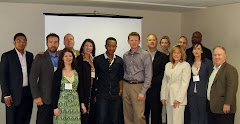Looking to produce a successful virtual event? To learn what works and what doesn't work with virtual events, we got some expert advice from:
- Mike Hicks, VP Marketing for Research in Motion
- Tom Wieser, VP Marketing for CGS
- Yannick Claereboudt Moderator for The CMO Club
 What is a virtual event?
What is a virtual event?A virtual event is an integrated platform to deliver a live experience in a virtual environment. The goal is to create a personalized experience for branding and marketing and encourage two-way communications and interaction. For the company, the goal is to get leads and nurture them. It's also a great forum to launch new products.
- Lead generation: In the physical world you really do not have a good sense of who is a good lead. In the virtual world you have lots more metrics. You can measure behaviors such as what the person downloads, what he says in surveys, and what he asks for. Put it all together and you get a picture.
- Low cost: For you and for the people coming to the event. No travel costs.
- Runs 24/7: In the physical world an event lasts just a few days and then shuts down usually around 5pm. Most attendees to virtual events come after work hours.
- International reach: Production level stays the same wherever you are, and anyone can reach you.
- Shorter time to market: A physical event takes 8 to 12 months to plan. Virtual events have a much shorter timeline.
- Measurable results: A virtual event gives you precise measurements that lead to real strategic actions.
Tips on how to produce a virtual event
- Segment by tracks, just like you would in a physical show. It gives virtual attendees the sense that there are sessions for them.
- Use a very detailed registration process. If your sessions are informative, people will be willing to give far more information than you think.
- At first focus on the stability of the platform.
- Schedule a high-value keynote speaker, and promote that person in all of your materials.
- Invite your partners to participate.
- Schedule at least 90 days for planning.
- Focus your content on the heavy users
Wiesner, for his part, recommended that companies blend physical events with virtual events. He also noted that in virtual events you need to touch customers for a longer time and in a more interactive fashion.
He further noted that sales teams want one thing: qualified leads. Virtual events can deliver, said Wiesner.Content is king at virtual events
Other lessons for virtual events
- If done right, you will get higher quality attendees to virtual shows.
- Prerecord sessions, but make subject matter experts available for questions.
- Watch your registrations. If you see more registrations than you planned for, add resources so you can handle the overflow.







No comments:
Post a Comment